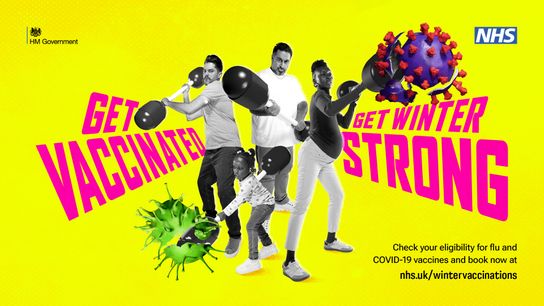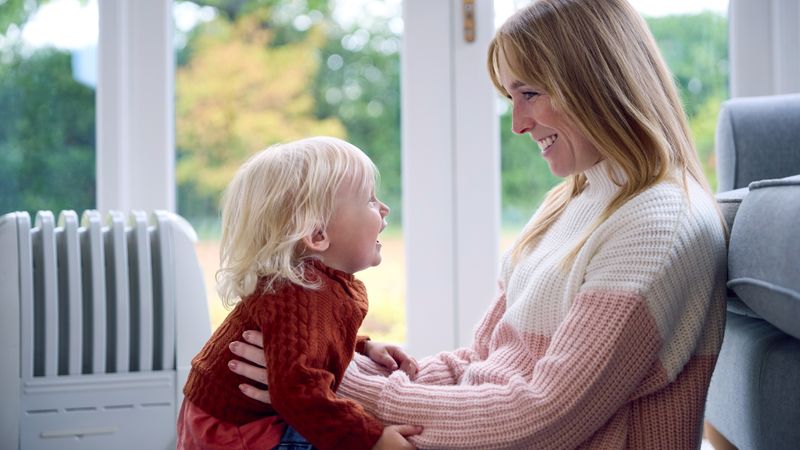The UK Health Security Agency (UKHSA) and Met Office Cold Health Alert system operates between 1 November and 31 March.
There is currently no Cold Health Alert in force for Kent.
The good news is there are many ways you can prepare yourself and your family to #GetWinterStrong - the name of government's national winter health campaign.

“If you can, please keep looking out for vulnerable family, friends and neighbours”
KCC Director of Public Health, Dr Anjan Ghosh, said: “Being prepared, keeping informed and following commonsense advice will help you and your loved ones stay safe and well when temperatures fall.
"If you can, please keep looking out for vulnerable family, friends and neighbours and if you are struggling with the cost of living, please visit kent.gov to find out what help is available."

“As well as offering safe, free, and welcoming places to go for warmth, warm spaces offer a chance to meet others”
Kent County Council Cabinet Member for Adult Social Care and Public Health, Dan Watkins, said: “Eating nutritious meals, keeping active and taking up the offer of free NHS vaccinations if eligible are key to helping you thrive in winter. Search ‘winter health’ on KCC’s kent.gov.uk website for more information and find out all you need to know about vaccinations at www.getvaccinatednow.
“KCC Libraries are also there for you in cold weather as they are part of the national warm spaces network. As well as offering safe, free, and welcoming places to go for warmth, warm spaces offer a chance to meet others. Use the Warm Welcome map at warmwelcome.uk to find the nearest warm space near you.”

“Should you need NHS help, NHS 111, online or via phone, is there for you and we list all pharmacies and urgent treatment centres at www.stopthinkchoose.co.uk”
Kate Langford, Chief Medical Officer at NHS Kent and Medway, said: “Prolonged cold weather can be a risk for anyone, but those who are vulnerable, including elderly people, those with breathing difficulties, and children under five, are particularly at risk.
“If you have a family member, friend or neighbour who might be vulnerable please do keep an eye out for them.
"Should you need NHS help, NHS 111, online or via phone, is there for you and we list all pharmacies and urgent treatment centres at www.stopthinkchoose.co.uk.”
Stay informed
Know when to get out the extra blankets and put on the kettle by keeping up to date with the weather forecast.
You can also sign up to receive Cold Health Alerts to help you prepare for chilly snaps.
The alerts are issued between November and March by the UKHSA and Met Office. Read more about the alerts; sign up.
Follow social media accounts of UKHSA (Facebook and X - Twitter) and the Met Office (Facebook and X - Twitter).
Look out for local advice from us on our Facebook and X - Twitter.
Be a winter friend
Some people are more at risk than others during and also after a cold snap because the impacts on our health can be delayed.
Even mild winter temperatures (8°C to 15°C) can present challenges for these vulnerable groups which include:
- older people
- very young children
- pregnant mums
- people who live with long-term conditions
- people living in poor housing
If you can, make time to check in on the vulnerable, including elderly, in your community.
NHS UK has lots of useful advice on how you can help.
Keep warm
Did you know that layering items of thin clothing will keep you warmer than wearing just one thick layer?
For lots more advice on staying warm at home, including a helpful video, visit our 'Keep warm this winter' page.

“...if you have a problem with issues like damp and mould, faulty heating systems or hot water supply don’t delay, contact your landlord today”
Brian Horton, Chair of the Kent Housing Group, said: “It is important for tenants in both the social rented and private rented sectors to work closely with their landlords to ensure that their homes are warm and safe places during the winter.
“Our advice to all tenants in Kent and Medway is clear – if you have a problem with issues like damp and mould, faulty heating systems or hot water supply don’t delay, contact your landlord today.”
Warm spaces
There are over 4,000 warm spaces across the UK, including our Kent Libraries.
Warm spaces offer a safe, free, and welcoming place to go for warmth, company and, in some cases, refreshment like a hot cuppa.
Use the Warm Welcome map to find the nearest warm space near you: www.warmwelcome.uk/find-a-space#map.

#GetWinterStrong by getting your flu and COVID jabs if eligible. Find out if you are eligible and how to book
Vaccinations
Did you know that COVID-19 and flu spread more easily in winter as we spend more time mixing with others indoors?
The NHS national booking system for COVID jabs has now closed for this winter. But you can still check if you're eligible for free seasonal vaccinations, and book appointments in other ways, at getvaccinatednow.co.uk.
Healthy choices
Want to keep winter bugs at bay?
Visit kent.gov.uk for tips and recipes to help you serve up delicious, nutritious meals – and save money on your food shopping: Eat well, spend less - healthy eating on a budget.
As well as eating healthily, it's important to keep moving. If it's safe to do so, wrap up warm, go for a walk and keep track of your daily steps.
With all the festivities, it's easy for your drinking to creep up on you. Keep in control of your units with free online tools such as the Know Your Score quiz.
Don't forget, one of the best things you can do for your health and finances is quit smoking. Find the best quit route for you – It’s well worth it! (now including Allen Carr's Easyway programme!)
For advice and support on staying healthy this Winter, visit One You Kent.
Feeling unwell
It's important to contact the NHS about any health concerns you have. But you can help the ease the pressure on the health service by choosing right service.
The emergency department is there for those who need it most. For example, those who have:
- severe chest pains
- serious head injuries
- loss of consciousness
- breathing difficulties.
If your condition is less serious, use Stop, Think, Choose to get the right treatment when you need it.
You should also use this service if you are worried about someone else's health.




